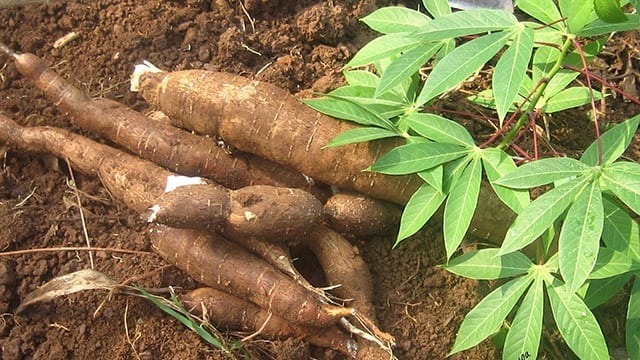Published
5 years agoon
By
Adubianews
The International Atomic Energy Agency (IAEA) has approved a €40,240-funding for the Biotechnology and Nuclear Agriculture Research Institute (BNARI) of the Ghana Atomic Energy Commission (GAEC) to produce cassava varieties that are tolerant to the Cassava Brown Streak Disease (CBSD).
The CBSD is caused by the Cassava Brown Streak Virus (CBSV) and the Ugandan Cassava Brown Streak Virus (UCBSV).
Reports of its occurrence in Burundi and the Democratic Republic of Congo indicate that the virus is spreading towards West Africa, which hitherto was considered CBSD-free.
The lead researcher on the project, Dr Wilfred Elegba, who is a Research Scientist at BNARI, disclosed this to selected journalists in Accra last Friday.
He noted that the project would help develop varieties of the crop tolerant to CBSD to prevent pandemics in West Africa.
“Cassava is an important staple crop that provides food and income for about 700 million Africans. However, its production in sub-Saharan Africa is severely constrained by viral diseases, key among which is CBSD,” Dr Elegba noted.
Project
The research project is titled: “Development of Cassava Brown Streak Disease Tolerance in Farmer-Preferred Cassava Using Gamma Radiation and Chemical Mutagenesis”, and will last from this year to 2026.
It forms part of the IAEA’s Coordinated Research project on “Development of Integrated Techniques for Induced Genetic Diversity and Improvement of Vegetatively Propagated and Horticultural Tree Crops”.
Techniques
Dr Elegba, who is also the Chief Scientific Investigator (CSI) for the project, explained the plant seeds, cuttings or cell cultures would be exposed to gamma radiation/rays.
That, he said, would be done in combination with plant tissue culture, which were plant mediates, cells or organs grown aseptically in a test tube to regenerate whole cassava plants which could be screened for tolerance to CBSD.
“Mutagenesis (a proven way of creating variation within a crop variety) represents an alternative strategy to overcome genetic barriers that limit the development of virus resistance and other desirable agronomic traits in cassava,” Dr Elegba said.
The other objectives of the project, he said, were to develop or refine protocols for tissue culture or the growing of plant cells in an artificial medium, chimera-free regeneration and retention of induced mutation in cassava and develop tools and methodologies for functional genomics, marker development, gene editing and/or genomic prediction in cassava.
The research team at BNARI was delighted to contribute to food security in Africa through the development of CBSD tolerance in cassava varieties that were cultivated by farmers in Ghana and Africa at large, Dr Elegba added.


Asiedu Nketia Uses NDC Thank You Tour to Collect Feedback on Government


Speaker Urges Executive to Grant Parliament Permanent Land


Finance Expert Warns Cocoa Reforms Could Worsen COCOBOD Debt


Jinapor Swears In New VRA Resettlement Trust Fund Board


Minority Demands Dismissal of COCOBOD CEO Over Cocoa Price Crisis


OSP Questions Baba Jamal Over Alleged Vote-Buying in Ayawaso East Primary


Police Arrest Woman Over Fire Incident at Alpha Hour Founder’s Church


NRSA: Commercial Tricycles Still Illegal Under Ghana’s Road Traffic Laws


NADMO Launches Rainy Season Safety Campaign in Fanteakwa South Markets

























